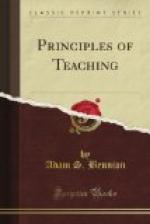25. Self-controlled, decision, Suggestible,
easily led, uncertain.
purpose.
26. Good physical carriage, dignity. Lack
of poise, ill posture, no
grace.
27. Taste in attire, cleanliness, Careless
in dress, frumpy, no pride.
pride.
28. Face smiling, voice pleasant. Somber expression, voice unpleasant.
29. Physical endurance, vigor, Quickly
tired, weak, sluggish.
strength.
30. Spiritual responsiveness, Spiritually
weak, inconstant,
strong.
uncertain.
31. Prayer life warm, satisfying. Prayer cold, formal, little comfort.
32. Religious certainty, peace, Conflict,
strain, uncertainty.
quiet.
33. Religious experience expanding. Spiritual
life static or losing
force.
34. God a near, inspiring reality. God
distant, unreal, hard of
approach.
35. Power to win others to religion. Influence little or negative.
36. Interest in Bible and religion. Little
concern for religion and
Bible.
37. Religion makes life fuller and Religion
felt as a limitation.
richer.
38. Deeply believe great Lacking
in foundations for faith.
fundamentals.
39. Increasing triumph over sin. Too
frequent falling before
temptation.
40. Religious future hopeful. Religious growth uncertain.
* * * * *
QUESTIONS AND SUGGESTIONS—CHAPTER IV
1. Think of the teachers who stand out most clearly in your memory. Why do they so stand out?
2. Name the qualities that made the Savior the Great Teacher.
3. If you had to choose between a fairly capable but humble teacher, and a very capable but conceited one, which one would be your choice? Why?
4. What is your argument against the idea, “Teachers are born, not made”?
5. Discuss the relative significance of the qualities quoted from Betts.
HELPFUL REFERENCES
O’Shea, Every-day Problems in Teaching;
Betts, How to Teach
Religion; Brumbaugh, The Making of a Teacher;
Palmer, The Ideal
Teacher; Slattery, Living Teachers; Weigle,
Talks to Sunday School
Teachers.
CHAPTER V
PERSONALITY
OUTLINE—CHAPTER V
The six major qualities:—a.
Sympathy.—b. Sincerity.—c.
Optimism.—d.
Scholarly attitude.—e. Vitality.—f.
Spirituality.




